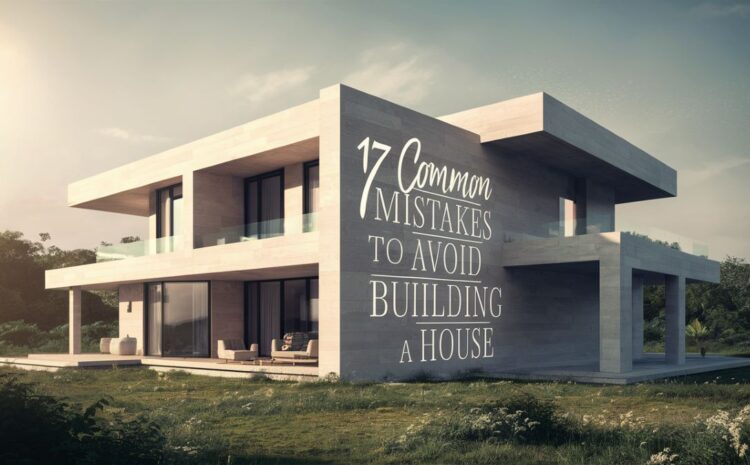
17 Common Mistakes to Avoid When Building a House
17 Common Mistakes to Avoid When Building a house
Table of Content
- 17 Common Mistakes to Avoid When Building a house
- Not hiring a qualified architect for your house design
- Not Hiring Interior Designer from Start
- Inadequate space planning when designing a house
- Not Hiring Structure and MEP consultants
- Not Hiring Project Management Consultants to avoid making mistakes when building a house
- Not Hiring Experienced & Professional Contractors to build your house
- No budget or timeframe for your custom home
- Not obtaining the necessary building regulations approvals
- Failing to plan and build with future expansion in mind
- Not following proper construction procedures
- Not getting anti-termite treatment done from professionals
- Not hiring professional & experienced waterproofing agency
- Choosing poor quality plumbing material & contractor
- Not using quality materials when building a custom home
- Prioritizing Time over Quality or Budget over Quality
- No established quality control procedures or checklists in place.
- Conclusion
- Q: What are some other common mistakes to avoid when building a house?
- Q: How can I avoid overspending when building a house?
- Q: What should I consider when designing my home?
- Q: How important is proper planning in building a house?
- Q: Why is it important to finalize all design details before construction begins?
- Q: What are some factors to consider when buying land for building a house?
- Q: How can I ensure that my house reflects my vision and style?
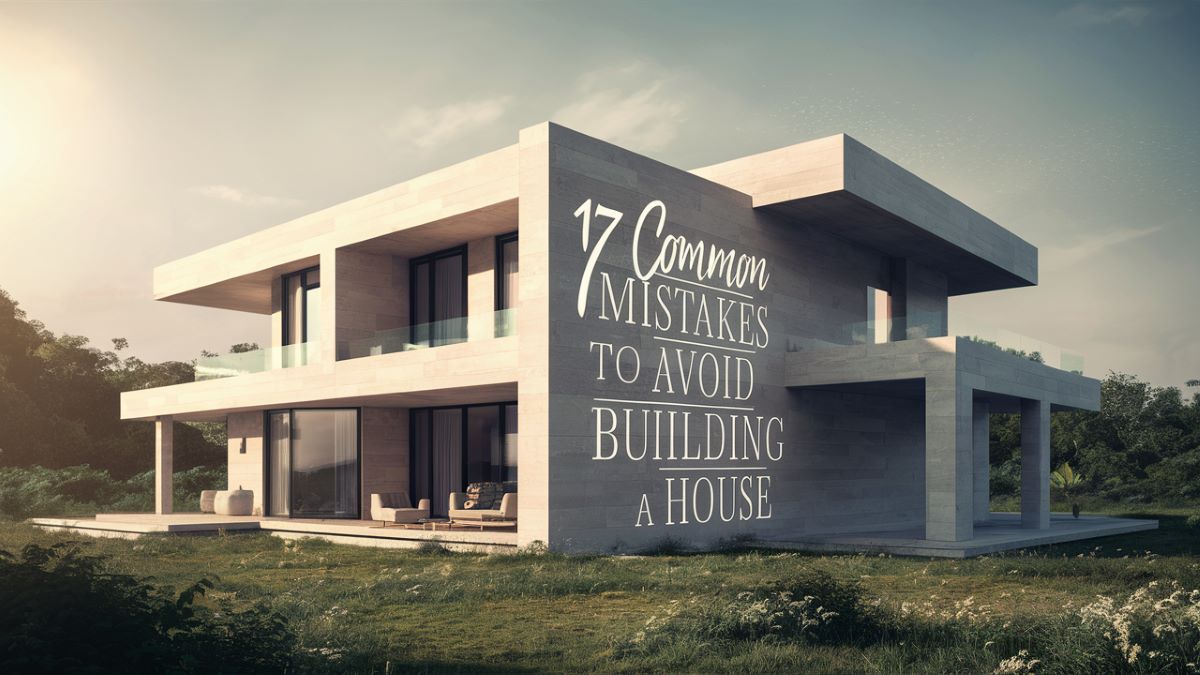
When we dream of building a house, we often don’t know where to start, highlighting the importance of considering the right design choices and building components from the beginning.
We receive a lot of ideas from many people and sources, both online and offline. Our friends and family all have their opinions, and we Indians love to share our opinions even when others are not seeking them :-).
There are numerous factors to consider to ensure a smooth and successful project. It’s necessary to take into account the choice of materials, as opting for low-quality materials may lead to future issues and higher maintenance costs.
Today, through this article, I want to help you avoid 17 common mistakes that people make. And honestly, I too have made few mistakes out of these during my 20 years of experience as a luxury home builder. So, let’s dive deep into these mistakes and how to avoid them.
Not hiring a qualified architect for your house design
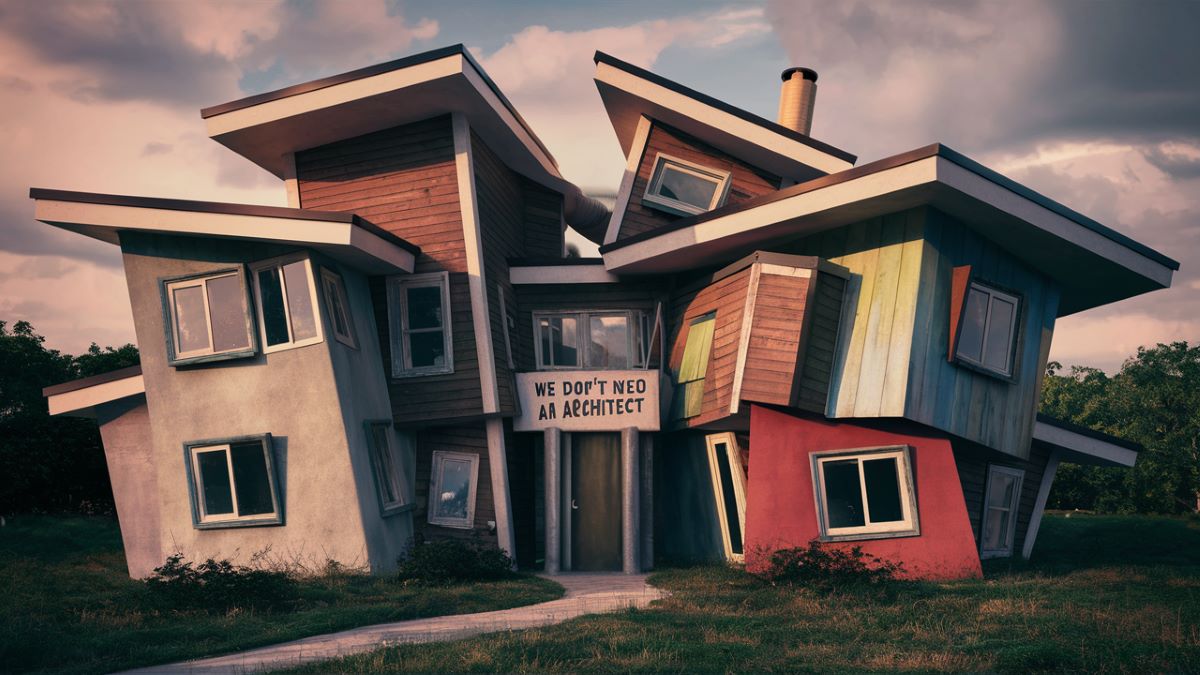
I have often seen people, especially when they are going to build a budget house, avoid hiring an architect because they don’t want to spend on hiring a professional. Well, this is the biggest and yet most common mistake made by many, even now in India. I will be very honest with you; I too made this mistake early in my career.
There’s a lot of value an architect will bring to the table. They also ensure that all stakeholders, including the client, are aligned with the vision of the house.
Not hiring a qualified architect for your house design can lead to various problems and challenges:
Poor design and functionality:
Without an architect, you may end up with a design that lacks proper functionality, usability, and flow. An architect can help you optimize the layout, lighting, and spatial arrangement of your house to better meet your needs.
Legal and regulatory issues:
Architects are well-versed in building codes, zoning regulations, and other legal requirements. Not having an architect involved in your house design could result in non-compliance with these regulations, leading to potential fines or delays in the construction process.
No idea about budget implications:
While hiring an architect may seem like an additional expense, their expertise can actually help you save money in the long run. They can optimize your design to be more energy-efficient, use cost-effective materials, and avoid costly mistakes during construction, essential aspects when building your home.
Lower Resale value:
A well-designed house by a qualified architect can add significant value to your property. Not hiring an architect could result in a design that is less appealing to potential buyers, ultimately affecting the resale value of your home, which is a crucial mistake to avoid when building a new house.
Overall, hiring a qualified architect for your house design is essential to ensure a successful and well-executed project. Their expertise, creativity, and attention to detail can help you create a functional, aesthetically pleasing, and valuable asset for your family.
Not Hiring Interior Designer from Start
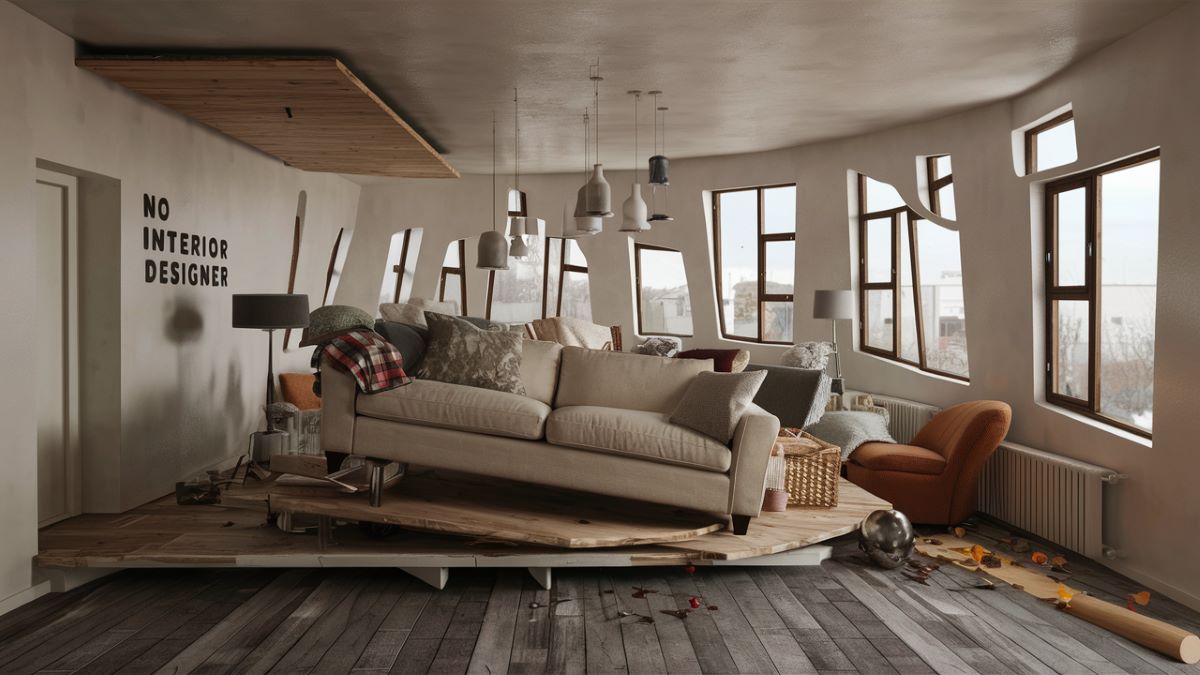
Like an architect, who brings a lot to the table in terms of design and aesthetics, interior designers also add a lot of value specific to your unique lifestyle. An interior designer must be involved at the start of the project to avoid any changes later on. Even in a few of the super luxury homes that I have worked on, this is one basic and silly mistake, I must say, should be avoided at any cost.
The biggest mistake of not hiring an interior designer at the start is that each occupant of the house will always have unique requirements for furniture, lighting, furnishings, home decor, etc. Only an interior designer can understand that and design the space accordingly at the start of the project; otherwise, you will end up redoing electrical wiring or other things based on these unique requirements.
Not hiring an interior designer from the start for your house can be a bad idea for several reasons:
Poor aesthetics and lack of uniqueness:
Interior designers have the expertise and experience to create a cohesive and well-designed space. Without their input, you may struggle to achieve the look and feel that you desire. Interior designers understand how the space or room will be used, so they decorate and furnish it in your own unique style for ex. layout & type of furniture to be used in your study room or wardrobe area.
Wastage of time and money:
Without a professional guiding the design process, you may end up making costly mistakes or changes that could have been avoided. Interior designers can suggest ways to make your house look beautiful by using cheaper and unique alternatives for ex. instead of using furniture from a luxury brand they can suggest you to get certified first copy of same furniture piece or instead of an expensive light for an imported brand they can suggest you to use cheaper tried & tested local brand of a light.
Lack of creativity:
Interior designers are trained to think creatively and come up with unique solutions to design challenges, including how to make use of natural light and optimize space when building a home. Without their input, your space may lack creativity and personality.
Overall, not hiring an interior designer from the start for your house can result in a lackluster design that may not meet your expectations. It is worth investing in a professional to help you create a space that is beautiful, functional, and uniquely yours.
Inadequate space planning when designing a house
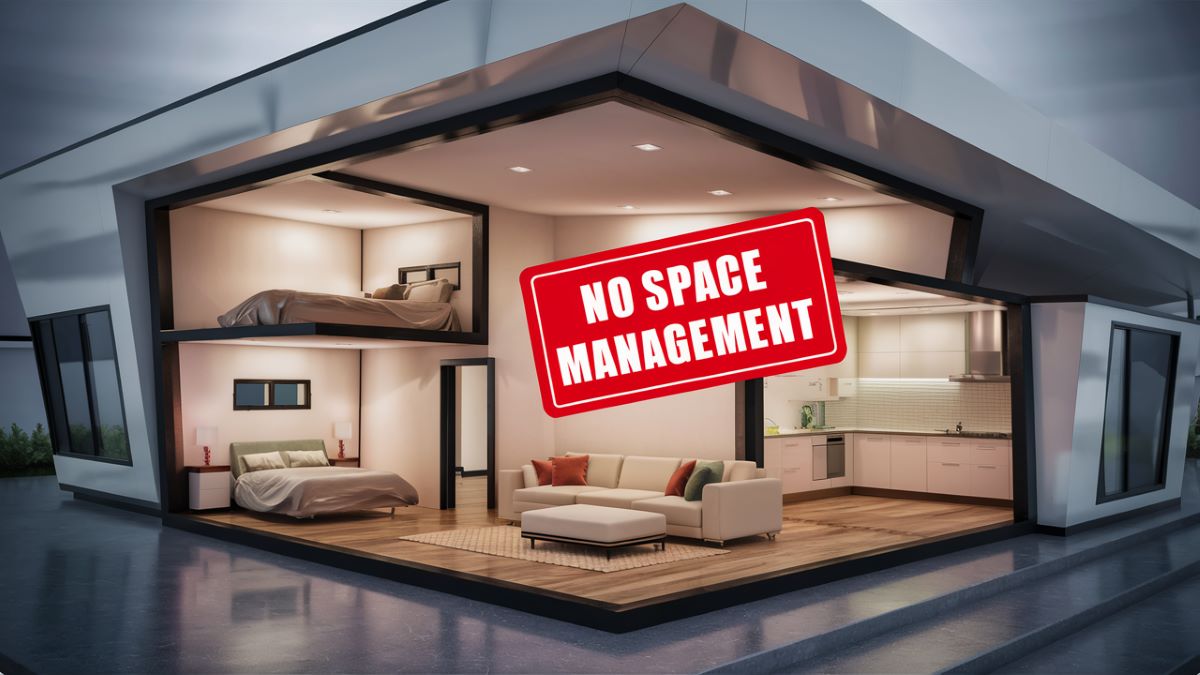
Proper space planning is crucial when designing a house to ensure efficient utilization of space and to create a functional and comfortable living environment. In my experience many architects somehow miss this very crucial point while designing smaller spaces.
Without proper space planning, various issues may arise, including:
Wasted space:
Without careful consideration of the layout and flow of rooms, there may be wasted space that serves no real purpose or is difficult to use effectively. This can make the house feel cramped or inefficient.
Inadequate storage:
Inadequate storage space can lead to clutter and disorganization, making it difficult to keep the house neat and tidy, which is a crucial aspect of space utilization in building your home. Proper space planning in home building includes incorporating sufficient closet storage solutions to meet the needs of the occupants.
Poor traffic flow:
A lack of consideration for traffic flow can result in cramped, awkwardly shaped rooms or tight spaces that are difficult to navigate. This can detract from the overall functionality and comfort of the house.
Limited functionality:
Without proper space planning, the layout of rooms may not be conducive to the activities and lifestyle of the occupants. For example, a kitchen that is too small or poorly laid out can make cooking and meal preparation challenging.
Lack of privacy:
Improper space planning can also lead to a lack of privacy within the house, with rooms that are too close together or poorly situated relative to each other. This can make it difficult for occupants to have their own space and can impact their overall comfort and well-being, emphasizing the importance of design choices that promote natural light and space.
In my view, proper space planning is essential in creating a well-designed house that meets the needs and desires of the occupants. It is important to carefully consider the layout, flow, and functionality of the space to ensure a comfortable and efficient living environment.
Not Hiring Structure and MEP consultants
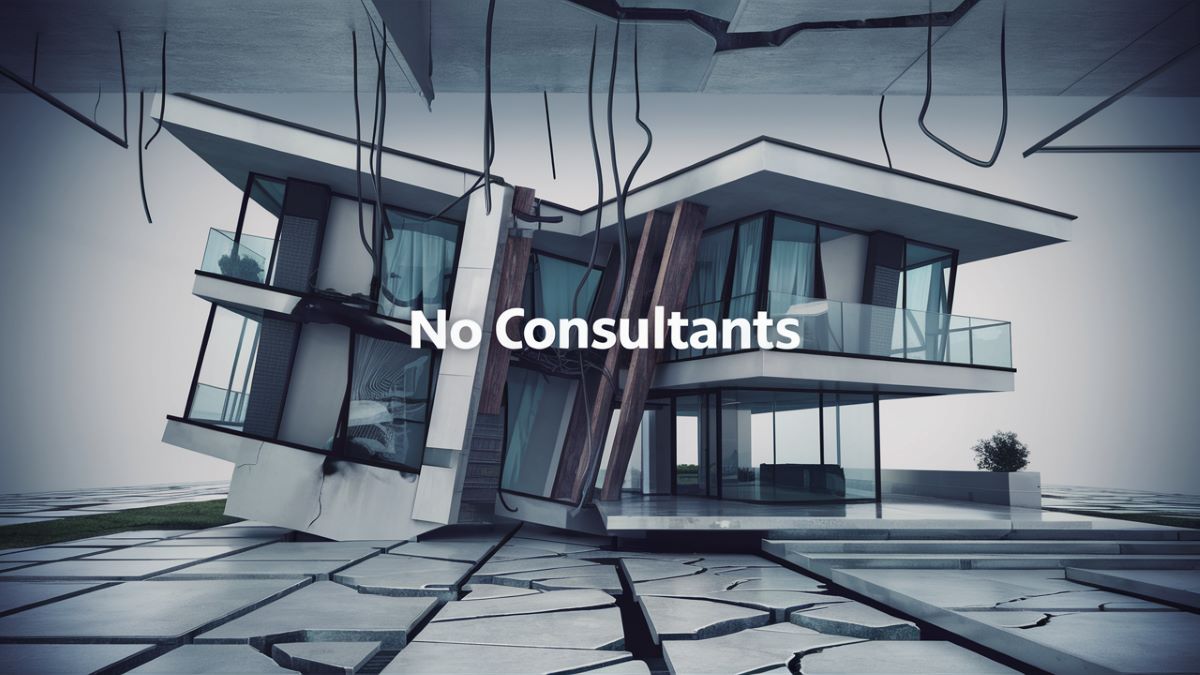
In a budget home I have seen almost no one hiring a structure and MEP consultants though they are as important as an architect and interior designer, which is a mistake to avoid when building a new home.
Without the expertise of Structure and MEP consultants, you may encounter issues such as structural deficiencies, inadequate ventilation, improper electrical wiring, and inefficient plumbing systems in your home. These professionals are essential for ensuring that your home is safe, functional, and energy-efficient.
By consulting with Structure and MEP experts during the design and construction process, you can avoid costly mistakes and ensure that your home meets all necessary building codes and standards. They will work with your architect and builder to ensure that your home is structurally sound, well-ventilated, and equipped with efficient mechanical, electrical, and plumbing systems.
Investing in the services of Structure and MEP consultants for your dream home construction is a wise decision that will pay off in the long run. With their expertise and guidance, you can rest assured that your home will be built to last and provide you with a comfortable living environment for years to come.
Not Hiring Project Management Consultants to avoid making mistakes when building a house
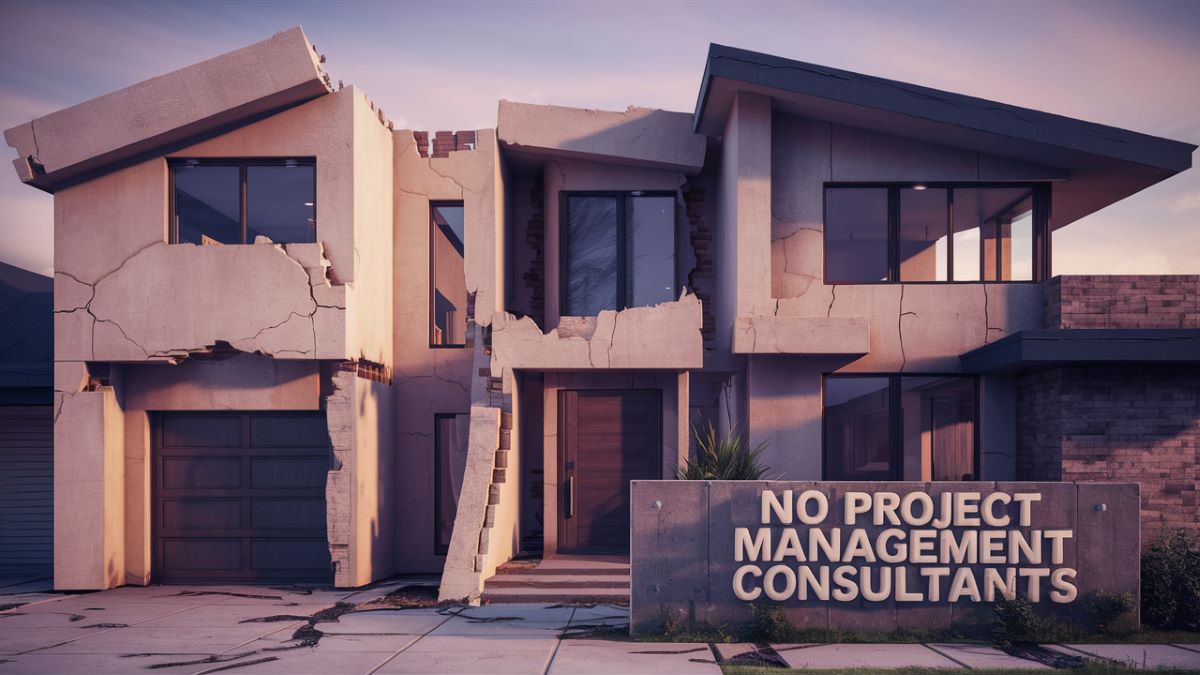
While it may seem like a cost-saving measure to forgo hiring a project manager when building a house, it can actually end up costing more in the long run due to potential mistakes and delays.
Project managers play a crucial role in overseeing the construction process, quality control etc. ensuring that all aspects of the project are running smoothly and on schedule. Without a project manager, there is a higher likelihood of miscommunication, errors, and oversights that can result in costly fixes and delays.
Additionally, project managers have the expertise and experience to navigate any unexpected challenges that may arise during the construction process, ensuring the building components are well integrated. They can also help ensure that the project stays within budget and meets all necessary building codes and regulations.
Ultimately, hiring a project manager is an investment that can help ensure a successful and efficient building process.
Not Hiring Experienced & Professional Contractors to build your house
Hiring inexperienced or unprofessional contractors to build your house is a sure shot way for thousands of problems and headaches. These contractors may not have the necessary skills or knowledge to properly construct a safe and structurally sound home, which can result in costly repairs and renovations down the line.
Inexperienced contractors may also cut corners or use subpar materials, compromising the quality and longevity of your home. This can lead to issues such as leaks, structural instability, and safety hazards that can put you and your family at risk.
By hiring experienced and professional contractors, you can ensure that your home is built to the highest standards and that the construction process is completed efficiently and effectively.
Professional contractors will have the expertise and resources to successfully manage the project, troubleshoot any challenges that arise, and deliver a finished product that meets your expectations.
Investing in experienced and professional contractors may require a higher upfront cost, but it can ultimately save you time, money, and stress in the long term. It’s important to do your due diligence and research potential contractors thoroughly before making a hiring decision to ensure that you are choosing the right team for the job.
No budget or timeframe for your custom home
Another common mistake people make is that they do not budget for construction cost or realistic schedule when building their homes. Not knowing how much it will cost and how many months it should take can lead to overspending and project delays. While hiring a project manager can help avoid this mistake, it is essential to have a clear baseline idea of how much budget is necessary for house construction and when this budget will be required, even if a project manager is not hired.
Developing a realistic timeline is crucial; being realistic about the timeline can prevent frustration and delays during the construction process. Similarly, being realistic about the budget is essential to avoid overspending.
Also, not accounting for unexpected costs or changes is another common mistake made when designing a custom home. It’s important to build in a contingency fund to cover any unforeseen expenses that may arise during the construction process.
Not obtaining the necessary building regulations approvals
Building your dream home without obtaining the necessary building regulations approvals can have serious consequences.
Without these approvals, the homeowner may face fines and legal action for building without proper permits.
It is important to always follow the proper procedures and obtain all necessary approvals before beginning any construction project. This ensures that the home is built to the required standards and that the homeowner is not liable for any violations.
In India, rules and regulations are typically challenging to interpret and are often subject to different interpretations by various individuals.
Although having a qualified architect onboard ensures familiarity with all necessary building regulations from the outset, not all architects assist in obtaining approvals from relevant authorities.
Working with a professional builder can help navigate the approval process and ensure that the home is built correctly and legally.
Failing to plan and build with future expansion in mind
When you have a plot of land to build your dream house, you need to take into account future expansion plans. Many people design and build homes only keeping in mind the current requirements and forget to consider how they will use the existing space after 10 to 15 years down the line.
It is not only about good design, better house plans, or space utilization but also about the construction of the house and incorporating building components that ensure quality. The construction materials used, whether quality construction is done or not, and whether as-built drawings for future expansion are made or not.
As-built drawings are created during the construction of the house and completed according to the work done. These drawings help homeowners in the future when they renovate or expand the existing house to include additional rooms and essential services.
It is important to consider potential future needs, such as growing family size or changing lifestyle preferences.
This includes leaving extra space for additional rooms, ensuring adequate structural support for potential additions, and planning for potential infrastructure upgrades, which are vital things to consider when building your home. By taking these factors into consideration during the initial construction phase, homeowners can avoid future structural issues, save additional costs, time, and stress in the long run.
Not following proper construction procedures
Not following standard construction procedures can result in a number of issues including structural instability, safety hazards, and potential legal complications.
It is essential to follow all local building codes and regulations, obtain necessary permits, and work with qualified professionals to ensure that the construction process is completed correctly and safely.
Failure to do so can lead to costly repairs, delays in completion, and potential liability for any accidents or damages that may occur as a result of the improper construction practices.
It is important to prioritize quality, safety, and compliance with regulations when building a house to ensure a successful and long-lasting finished project.
It is the duty of project managers and professional contractors to follow standard construction procedures. Therefore, choosing the right project manager and contractors for the construction of a house is imperative.
Not getting anti-termite treatment done from professionals
Termites are among the most challenging pests to manage when a house becomes infested. This, coupled with poor waterproofing and subpar plumbing work, constitutes three of the most detrimental issues that can significantly devalue a property.
Termites, often referred to as silent destroyers, can cause extensive damage to the structure of a home, leading to costly repairs. Their ability to silently feed on wood and other cellulose materials without immediate detection makes them a formidable enemy for homeowners.
Receiving effective anti-termite treatment from professionals at various times such as when construction begins, while construction is going on, and after construction is finished, guarantees that your home is protected from this quiet destroyer and avoids any monetary damages.
I recommend using Bayer’s Premise and Agenda chemicals at different phases of the construction process.
Not hiring professional & experienced waterproofing agency
Despite being apparent, it is common for individuals to mistakenly hire inexperienced professionals or use low-quality materials for waterproofing.
Consider a stunningly designed home that is ruined by poor waterproofing work, resulting in a shabby appearance or leakages in the rooms rendering them unusable.
My recommendation is to hire a qualified contractor of waterproofing who can ensure that the job is done correctly the first time, saving you time and money in the long run. It’s important to do your research and choose a reputable company with a track record of successfully waterproofing properties.
I recommend “Tanking” procedure which is relatively expensive but foolproof and PU based chemicals for waterproofing.
Choosing poor quality plumbing material & contractor
As mentioned earlier, poor-quality plumbing work is one of the most significant problems that can significantly degrade a house, and it’s a critical mistake to avoid when building a new home.
Actual cost of a plumbing work, out of the total project cost for home building, is usually less than 2% (when considering the complete cost of a project including land). Poor-quality work during the construction of a house can lead to a myriad of issues down the line.
Some potential problems that may arise include:
Leaks:
Low-quality pipes, fittings, or improper installation can lead to leaks in the plumbing system, causing water damage to the property.
Clogs:
If the plumbing pipes are not properly installed or are made of cheap materials, they may be more prone to clogs, which can cause backups and slow drainage throughout the house.
Corrosion:
Inadequate materials can lead to corrosion within the plumbing system, reducing its lifespan and potentially causing water contamination.
Inefficient fixtures:
Poor quality fixtures such as faucets, toilets, and showers may not function properly, leading to wasted water, higher utility bills, and constant repairs or replacements.
Health hazards:
If the plumbing system is not properly installed or maintained, it can lead to health hazards such as mold growth due to water leaks, or sewage backups that pose a risk of contamination.
It is important to hire experienced and reputable plumbing contractors to ensure that the plumbing system is installed correctly and with durable materials.
Don’t skimp on quality whenever you are looking to buy every fixture throughout the house for example kitchen and bathroom fixtures including fixtures which are not readily visible such as nipple extension, as these fixtures play a significant role in overall quality of a house.
Not using quality materials when building a custom home
Using subpar materials when building a custom home can lead to a variety of issues down the line. Weaker materials may not be as durable or long-lasting, resulting in the need for more frequent repairs and replacements. This can end up costing the homeowner more in the long run and may also compromise the structural integrity of the home.
In addition, using low-quality materials can lead to a decrease in the overall value of the home.
Potential buyers may be turned off by the use of cheap materials and may be skeptical of the quality of the construction. This can make it more difficult to sell the home in the future and could result in a lower selling price.
Overall, it is important to invest in high-quality materials when building a custom home to ensure that it is built to last and maintains its value over time. Investing in quality materials upfront can save money and headaches in the long run.
Prioritizing Time over Quality or Budget over Quality
Prioritizing time over quality when building a dream house may lead to rushed decisions and potentially lower-quality materials or workmanship. While this approach may result in a quicker completion of the project, it can ultimately lead to dissatisfaction with the final product.
On the other hand, prioritizing budget over quality may mean cutting corners or choosing cheaper materials and finishes to save money. This can result in a dream house that does not meet expectations or stand the test of time.
Ideally, when building a dream house, the best approach is to prioritize quality above all else. This means taking the time to research and invest in high-quality materials, workmanship, and design elements that will create a home that is built to last and fully meets your vision.
While this may require a larger investment upfront, the long-term benefits of a well-built and carefully planned dream house will ultimately outweigh any shortcuts taken to save time or money.
No established quality control procedures or checklists in place.
The lack of quality control procedures or checklists during the construction of a house can lead to a variety of issues such as defects in the structure, improper installation of lights or plumbing fixture, safety hazards, and overall poor quality of finish & workmanship.
Without proper quality control measures like detailed checklists in place, there is a higher risk of costly and time-consuming rework, as well as potential safety concerns for the occupants of the home.
In order to ensure a high level of quality in construction projects, it is important to implement thorough quality control procedures and checklists at every stage of the building process.
This can include regular inspections by qualified project manager or quality control engineers, adherence to building codes and regulations, and clear communication between all parties involved in the project.
By prioritizing quality control measures, builders can help to prevent costly mistakes, ensure that the finished product meets standards and specifications, and ultimately deliver a safe and well-constructed home to their clients.
Conclusion
As we discussed 17 common mistakes that must be avoided when building a house, it’s crucial to be aware of both obvious and less apparent mistakes. As a general rule, we should always hire professionals to handle their tasks, especially in complex fields like home construction.
It’s imperative to hire professional contractors for several reasons. They possess the expertise and experience necessary to ensure the construction process runs smoothly.
Moreover, professional contractors have access to the latest construction techniques and technologies, ensuring that the project is completed to the highest standards.
Using good quality materials is another essential aspect of building a house. While it may be tempting to cut costs by opting for cheaper materials, this often results in inferior construction and higher maintenance costs in the long run.
Quality materials not only enhance the durability and longevity of the structure but also contribute to its overall aesthetic appeal.
Proper waterproofing and anti-termite treatment are essential to protect the structure from moisture damage and pest infestations. Investing in these preventive measures can save homeowners significant costs in repairs and maintenance in the future.
It’s crucial to ensure that the plumbing work is of the highest quality. Poorly installed plumbing can lead to leaks, water damage, and other issues that can compromise the integrity of the building. Hiring skilled plumbers and using quality materials can help prevent these problems and ensure that the plumbing system functions efficiently for years to come.
It’s important to prioritize quality over speed and ensure that every aspect of the construction process is carried out meticulously.
Additionally, quality control procedures should be implemented throughout the construction process to maintain standards and identify any issues before they escalate. Regular inspections and checks can help ensure that the project stays on track and meets the required quality benchmarks.
Before starting construction, be sure to take inspiration from similar projects and read our guide to avoid common mistakes. By carefully considering these various kinds of factors, you can have the freedom to choose wisely and build your dream home without encountering unnecessary setbacks.
Finally, adhering to standard construction processes is most crucial for the success of any building project. These processes have been developed and refined over time to ensure optimal results and minimize the risk of errors.
By following established procedures, builders can streamline the construction process and deliver a high-quality end product.
Q: What are some other common mistakes to avoid when building a house?
A: There are several other common pitfalls to avoid when building a house, such as overspending, not properly planning, overlooking necessary permits like planning permission, health and safety of construction workers and neglecting to consider the timeline and potential delays.
Q: How can I avoid overspending when building a house?
A: To avoid overspending, it’s essential to establish a realistic budget, get multiple quotes from contractors, stick to your budget as much as possible, and avoid unnecessary upgrades.
Q: What should I consider when designing my home?
A: When designing your home, it’s crucial to consider your specific tastes and needs, the type and quality of materials to be used in the construction, as well as the functionality and flow of the space.
Q: How important is proper planning in building a house?
A: Proper planning is essential when building a house as it helps avoid potential delays, ensures that all necessary steps are taken in the right order, and brings your vision to life more effectively.
Q: Why is it important to finalize all design details before construction begins?
A: Finalizing all design details before construction starts helps prevent problems later on, such as design changes mid-project, added costs, delays, and conflicts with contractors.
Q: What are some factors to consider when buying land for building a house?
A: When buying land, it’s important to consider the location, size, topography, zoning regulations, access to utilities, and potential weather delays that may affect construction timelines.
Q: How can I ensure that my house reflects my vision and style?
A: To ensure your house reflects your vision and style, work closely with your architect or designer, communicate your specific tastes and needs clearly, and provide examples or references from past projects that inspire you.
